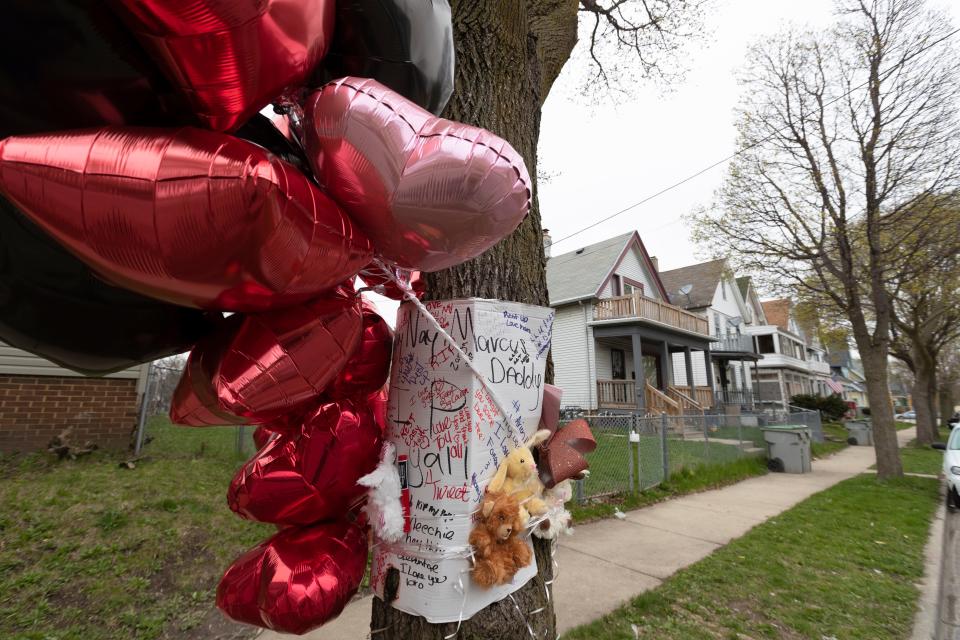How Wisconsin’s ‘honor’ system for removing guns from domestic abusers failed Jesi Ewers

The attack came without warning and, as far as Jessica “Jesi” Ewers could tell, without provocation.
It was early in the morning of Oct. 19, 2020. Asleep at her home near Cottage Grove, she woke up to her boyfriend, James “J.T.” Budworth, beating her. He punched her, tried to strangle her, destroyed her cellphone and threatened to kill her and her children. He also bit her, once on the collarbone and once on the arm, where he tore off a chunk of flesh.
Later, Ewers told police it wasn’t the first time Budworth had attacked her. He drank heavily and abused testosterone and human growth hormones and threatened to kill her regularly.
Dane County sheriff’s deputies took him into custody, and when he was released four days later, there were conditions to his bail — he wasn’t supposed to have any contact with Ewers, use drugs or alcohol, or possess “any type of dangerous weapon.” This last point was especially important, because Ewers had told authorities that Budworth kept many guns at the residence they shared.
The conditions of his bail should have kept Budworth from using those guns. They didn’t. Two months after being released from custody, Budworth used one of them to murder Ewers before taking his own life. Ewers’ five children lost their mother.
Sati Ewers-Kubly, one of Ewers’ daughters, said the system failed to protect her mother.
Asking people to voluntarily give up their guns is “the equivalent of expecting a car thief to return the car and turn themselves in — it’s not going to happen,” she said.
Yvonne Ewers, Jesi’s mother, told Wisconsin Watch she doesn’t “know much about the legal loopholes” that allowed Budworth to keep that gun.
She added, “I still can’t believe it happened. It’s what you see on the news happening to someone else.”

The year 2020 saw a record for fatal domestic violence in Wisconsin, with 58 people murdered — the most since at least 2000, according to a report by End Domestic Abuse Wisconsin. The 2020 data, the most recent available, also saw Wisconsin’s highest-ever recorded proportion of victims shot and killed by abusers prohibited from owning guns. These murders accounted for nearly a quarter of all victims — Jesi Ewers among them.
While mass shootings dominate the news, people in the United States are much more likely to be shot by a family member or intimate partner. The U.S. Centers for Disease Control and Prevention reports that 74,623 people were killed by firearms in 2020, most by a family member, intimate partner or acquaintance.
At least 110 dead due to loopholes
Cases like Ewers’ expose a specific problem: The system to ensure that abusers don’t have access to guns fails victims again and again.
Wisconsin isn’t alone in this regard. In a 2021 investigation, Reveal from the Center for Investigative Reporting identified at least 110 domestic violence homicide victims shot and killed by abusers prohibited from possessing guns. There is no federal or nationwide organization that tracks these types of homicides, the investigation found, making that number “almost certainly a vast undercount.”
In many circumstances, law enforcement lacks the authority to confiscate weapons, even when bail conditions like those applied to Budworth prohibit gun possession. Meanwhile, laws aiming to bar convicted felons from accessing firearms are riddled with loopholes. Proposals exist to close some of the gaps, but not all; none would modify the system that failed Jesi Ewers.
Compounding the problem, domestic violence homicides committed with guns are rising nationwide, the Reveal investigation found, citing previously unpublished FBI data. In just the past decade, gun homicides by intimate partners spiked by 58%. Then, in 2020, such homicides rose by 25% compared to 2019 — the highest numbers recorded in nearly 30 years.
Removing guns saves lives
Experts cite a raft of data in favor of removing guns from people accused of domestic abuse. Above all, the presence of guns in an abusive situation meaningfully increases the chances of homicide.
“In homes with domestic violence, and (where) the abuser has a firearm, the victim is five times more likely to be shot and killed by that firearm than in other homes with domestic violence where there’s not a firearm,” said Shannon Barry, executive director of Domestic Abuse Intervention Services in Madison.
Despite the risks of abusers with guns, Wisconsin’s processes intended to divest abusers of their weapons largely rely on an “honor system,” particularly during the pretrial period — when Budworth murdered Jesi Ewers.
In Wisconsin, authorities can proactively remove an abuser’s guns only in response to a violence protection order against the abuser.
Wisconsin law prohibits respondents in domestic violence protection orders from possessing and purchasing firearms. When a court determines that a protection order meets this standard, respondents must list all the firearms to which they have access. (This did not apply to Budworth, who faced a no-contact order but not a domestic violence protection order.)
The court then orders that the firearms be surrendered with a date, time and a place. In Wisconsin, the county sheriff’s office usually takes possession of them.
Finally, the court will hold a hearing to see if the defendant has complied with the order — usually after two weeks have passed.
“I think there needs to be that follow up, and that follow up needs to be much quicker,” said Ryan Poe-Gavlinski, director of the Restraining Order and Survivor Advocacy Clinic at the University of Wisconsin Law School. “In restraining order cases, they do that firearms surrender hearing two weeks out, but why are we not doing them within 48 hours?”
How the honor system failed Jesi Ewers
The system largely relies on respondents’ honesty about their weapons access — hardly a guarantee, experts say. And although Budworth was prohibited from having firearms as a condition of release on bail, no surrender protocols ensure that defendants comply.
“If someone is given a bail condition not to possess weapons, that is entered into record, and if the person violates, they would be subject to additional criminal charges,” said Elise Schaffer, spokesperson for the Dane County Sheriff’s Office, which handled the Ewers case. “Basically, all of this is still on the ‘honor’ system, because we do not go in and search a person’s home to clear it of firearms as a matter of ensuring compliance.”
In other words, although the defendant’s bail would be revoked if the weapons prohibition is violated, there is no mechanism in place to check.
“For a lot of people, the system works the way it should,” Poe-Gavlinski said. “(But) the folks who are going to want to try to kill somebody are probably going to find a way to get a weapon no matter what and kill them anyway.”
For Jesi Ewers, the “honor system” appeared to have worked — at least at first. Weeks after his release on bail, Budworth voluntarily surrendered firearms that had been stored in the house he shared with Ewers, handing them to a third party.
But Budworth didn’t surrender all of his guns — he reported three of them “stolen.” After Budworth murdered Ewers, authorities discovered two of those guns had remained inside the house all along.
Said Ewers-Kubly: “I absolutely think that the ‘honor system’ is inadequate.”
King County, Washington, finds a better way
The Regional Domestic Firearms Enforcement Unit is a multidisciplinary team of law enforcement, advocates and prosecutors in King County, Washington. Established in 2018, it helps implement a state law requiring respondents of certain protection orders to surrender their weapons. It is considered the nation’s most proactive system for removing guns from respondents in protection orders.
The unit works mostly on domestic violence protection order cases, but it also assists in cases in which bail conditions prohibit weapons, handling more than 1,000 cases a year, said Sandra Shanahan, program manager of the unit.
The unit “activates” when the court issues the order — kickstarting a proactive firearms removal process that includes information from the victim about the presence of weapons.
Apprised of the Ewers case, and told that Budworth had surrendered some but not all of his weapons, unit member Kim Wyatt, also a senior deputy prosecuting attorney in the King County Prosecutor’s Office, called such situations “our biggest fear.”
Enforcement gaps remain
Federal law prohibits people convicted of misdemeanor domestic violence from owning guns, but this law is not in place at the state level in Wisconsin.
As it stands, local prosecutors and police cannot enforce a weapons ban in these misdemeanor cases without federal law enforcement stepping in, said state Rep. Lisa Subeck, D-Madison. She has introduced a bill that would bring state law in conformity with federal law but said she is not optimistic it will gain traction in the Republican-controlled Legislature.
When it comes to felons, however, both state and federal law bar people convicted of any felony, including domestic violence, from possessing guns.
The majority of abusers who used illegal guns to kill their victims in 2020 fell into this category — they were prohibited from having firearms because they were already convicted felons, data from End Domestic Abuse Wisconsin show.

For example, on April 27, 2020, 43-year-old Christopher Stokes called Milwaukee police and reported that he had just shot and “massacred” his entire family of five. He later pleaded guilty to five counts of first-degree reckless homicide. Stokes was previously convicted of felony domestic violence in 2012 and was prohibited from owning firearms.
Part of the problem, experts say, is that background checks are not required for all gun purchases in Wisconsin, potentially allowing felons like Stokes to acquire firearms despite their history.
Licensed firearms dealers catch felony convictions in their screenings, but many guns are purchased from private sellers over the internet or at gun shows, where background checks are not required. Previous efforts to close the so-called “gun show loophole” have failed to pass the GOP-controlled Legislature, despite overwhelming public support for such a measure.
“In my mind it makes zero sense that whether you get a background check depends on from whom you purchase your firearm,” Subeck said. “A firearm is every bit as dangerous if it’s purchased from your cousin, your uncle, or neighbor up the street, or some guy on the internet, as it is if you purchase it from a firearm dealer.”
Ewers-Kubly agreed, saying she favors a “red flag” law that would keep domestic abusers from buying guns — from anyone.
“There are no words to describe how deeply the loss of our mother has impacted our family,” Ewers-Kubly said. “She had such a contagious energy that the entire universe felt empty when we lost her.”
Coburn Dukehart and Phoebe Petrovic contributed reporting. The nonprofit Wisconsin Watch (www.WisconsinWatch.org) collaborates with WPR, PBS Wisconsin, other news media and the University of Wisconsin-Madison School of Journalism and Mass Communication. All works created, published, posted or disseminated by Wisconsin Watch do not necessarily reflect the views or opinions of UW-Madison or any of its affiliates.
This article originally appeared on Milwaukee Journal Sentinel: Wisconsin’s honor system for removing guns for domestic violence fails

